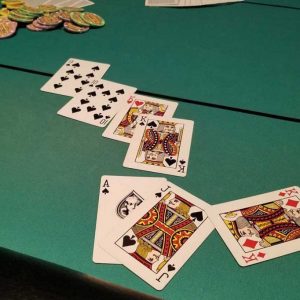Stud Poker Strategy – Playing Fourth Street

We’ve finally cleared the hurdles of reviewing Seven Card Stud starting hands, so now we can move on to talk a little about play on later streets. This week, we will discuss a bit about Fourth Street play in Seven Card Stud.
Unlike other poker games, Stud gives you a lot of information about your opponent’s hand than you’d see in Texas Hold’em. This will play a lot into the decisions you will make on Fourth Street and beyond.
Evaluating Boards
The first thing you will do on Fourth Street is to evaluate the boards of all players the hand. What did they catch on Fourth Street? Are any of their outs showing in other hands? Are any of your outs showing in other hands?
How did the card impact their hand? If they picked up an open pair on fourth street, they clearly improved their hand. Other cards may or may not improve their hand and unfortunately, it’s going to be hard to guess whether they improved unless you’ve picked up a read on their hand.
One key thing to look for is for developing straight and flush boards. This will plan an important factor in later streets and is something you need to pay attention to when evaluating boards and player outs on future streets. Next, let’s talk about some common scenarios.
Catching an Open Pair
When someone refers to an open pair, they are referring to a pair showing in a player’s hand on Fourth Street. You started with a door card 10 and then caught a ten on fourth. This is an open pair. In this spot, you will have the option to make a double bet. If you are playing $2-$4 Stud and catch and open pair on Fourth Street, you can opt to bet $4.
A common rule of thumb to follow in Stud is that a player that catches an open pair on Fourth Street likely has just improved to trips. At worst, they likely now have two pair. While that is not always the case, you should proceed as if they caught trips. Unless you have a big hand yourself or a substantial draw, this is a good time to fold.
If you catch an open pair on Fourth Street, it is a good idea to make that double bet to try and force out the competition.
Playing a Straight or Flush Draw
Straight and flush draws are generally very easy to play on Fourth Street. If you improve to a four-card straight draw or a four-flush, then it is generally a good idea to take a card off to try and catch your straight on Fifth Street.
If you fail to improve to a four straight or a four-flush, then your decisions are going to be based on your opponent’s board and the number of outs that have hit other boards. If you have not counted more than two points worth of outs and your opponent didn’t clearly improve, you may be ok to call a small bet. Otherwise, you’re going to be looking to fold here.
Even if you improve to a four straight or four-flush, you may consider folding your hand to significant improvement or significant action. For example, if you improve to a gutshot straight draw and a tight player catches an open pair, a fold here is ok.
Playing Two Pair
Playing two pair should be played straightforward while you’re learning the game. By this, we mean that you should be betting out with a split two pair. You hand is somewhat disguised and other opponents are going to assume that you probably have a big pair in the hole.
If you have a big card like an ace or king and catch a second pair, they will likely credit you with one pair rather than two. Betting here will force your weaker hands to bow out. If you receive resistance, then consider slowing down unless you think they are simply playing back at you.
Playing Quads
Not a common scenario in Stud poker games, but if you happen to become rolled up and catch an open pair on fourth, how you proceed is important. The type of quads you hold will be important.
If you have a big door card and catch a pair, checking here is going to make everyone else slow down and will kill your action until someone catches up. That’s OK. You WANT them to catch up and play back at you later, so it’s OK to check.
When you have a low rolled up set and catch quads, its generally a good idea to make that double bet. Unless you’re playing super snug, players are going to figure you’re making a play or have two pair at best. If they have anything they think they can improve upon to beat you, they will play along.
If someone else happens to catch an open pair and bets into you, go crazy with raising. Is there a chance they also have just caught quads? Sure, it’s “possible” but for that one time out of 100, you will build a monster pot 99 other times.
Next week, we will take a look at playing Fifth Street in Seven Card Stud. Fifth Street is the most important street and will make or break most players.
